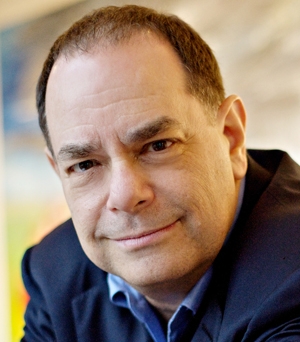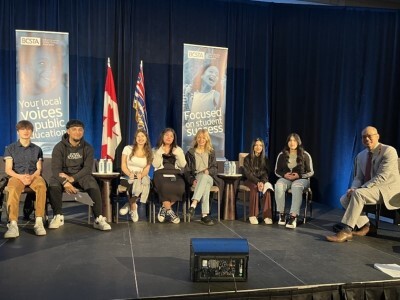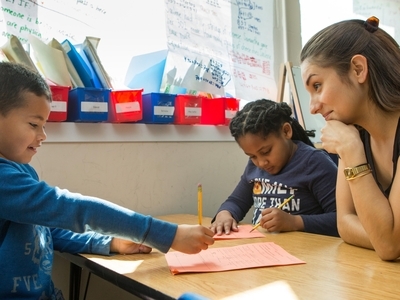EMPOWERED! Re-Framing Growing Up for a New Generation, Part 2
Topics
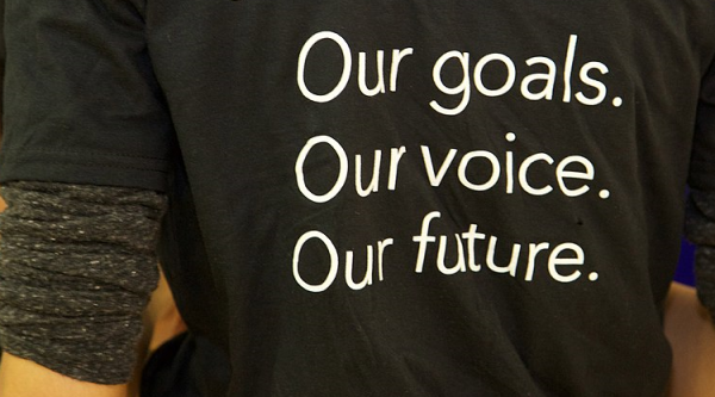
Next generation learning is all about everyone in the system—from students through teachers to policymakers—taking charge of their own learning, development, and work. That doesn’t happen by forcing change through mandates and compliance. It happens by creating the environment and the equity of opportunity for everyone in the system to do their best possible work.
An empowered vision for the new generation of humans now growing up centers on young people having the power, while they are still young, to make their world a better place.
Note: This article is a reprint of the second half of “Chapter 1: Re-Framing a New Journey for a New Generation” of the author’s book, EMPOWERED! Re-framing ‘Growing Up’ for a New Age. If you haven't already, you may want to read the first half of Chapter 1 first.
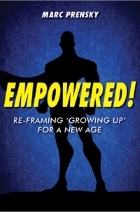
Framing a New World, and a New Process of Growing Up
Because today’s adults—all 20th century-born—grew up in a world where those still being “raised” had almost no power at all, the New Journey to Empowerment begins with today’s young people. A key part of starting their new journey is a re-framing of how those young people—21st-century humans—see the world they live in. Far more profoundly than most adults realize, theirs is already a very different world from the 20th-century, when all today’s adults grew up—and they know it.
A great many young people (along with some, but fewer, adults) have begun to understand how fast the world is changing, and that a “new process of growing up” is required for individuals to thrive in their new and different world of the mid-to-late 21st-century, even though—as yet—most young people are unable to articulate this. In some cases, adults are helping young people build this new growing up process, as science gains new knowledge about humans’ early years and how to shape them.
But when adults are not offering positive help in designing a new process—and in most cases they are not—the young people are left to design it on their own. And, in fact, they already are doing so. The re-framing that they are already doing for their new world, and that we shall see, includes how they—i.e., 21st-century young people—view:
- their coming times,
- who they are,
- what they believe,
- what their world will be like,
- what they should aspire to,
- what is universal for all of them,
- what they are called,
- and the whole process of how they go from birth to adulthood—what is generally called “growing up”
in and for their own times and new Age.
This book is about describing this re-framing and the young people’s new journey—at least as it appears to me. I will discuss what I see as the different ways young people are beginning to see the world and changes in the various “phases” of growing up that I see coming. I will show how young peoples’ beliefs are changing—in ways that lead to new humans being far more empowered than they were in the past. The “New Journey to Empowerment” has several stages, and to get there, all these stages will need to work in sync.
To Empowerment from Where?
As our young people move to empowerment, it is worth asking “from where do they start?”—particularly from their (i.e., from the young people’s) point of view.
I believe our young people are finally about to leave a very long period characterized, mainly, by control—both by parents and schools—and, particularly recently, of considerable floundering. Despite adults’ sometimes-offered opinions that both these things are “good for them,” neither control nor floundering are things most young people enjoy.
Many of the coming changes are so profound and different that they are difficult, in many cases, for the current adult generation to accept. Today’s adults are, in a deep sense, the last in their line. All of them were born, and most grew up, in the 20th century, before the internet and digital technology fully entered human life. Today’s adults are the “Last Pre-Internet Generation” the world will ever know. Today’s young people, as I foresaw 20 years ago, are the first true “digital natives.”
ALL Dreams—Not Just Some
In the new world they are growing up in, I believe these Digital Natives will be able to do much better, starting much earlier.
I believe, strongly, that this is true for all of them—not just for those who have the most immediate access to new technology. The technology may still be coming for many, but the dreams are already there for all.
It bears remembering—and repeating—that all young people start with dreams—a great many of which get crushed as they grow up. Now for the first time in history, all those young people are becoming empowered to realize those dreams, to a far greater extent than ever in the past. Those dreams may include, but do not require, having technology—at least not first.
This does not mean every person who happens to be young will achieve dreams of becoming rich or becoming a rock star. But it DOES mean that people who happen to be young are now getting the power, while they are still young, to make their world a better place in ways they can imagine. This was not generally possible in the past.
Bringing Out, Not Putting In
The new frame is, overall, in at least one important respect totally opposite from the old, 20th-century frame. The old frame of growing up was all about putting things INTO young people, including beliefs, culture, history, knowledge, and more. We spent so much time doing that—and then testing whether our inputs got in—that we hardly ever listened or cared about what was coming out. Essentially, we tramped down, and often extinguished, the output and imagination of a huge portion of our people—the young—all their young lives because we thought they had nothing to contribute until we shaped them to our ways and purposes. And then, when they grew up, we complained about their lack of imagination!
The New Age of Empowerment is less about putting things into people, and more about bringing out what is already there. This graphic illustrates and underscores the change:
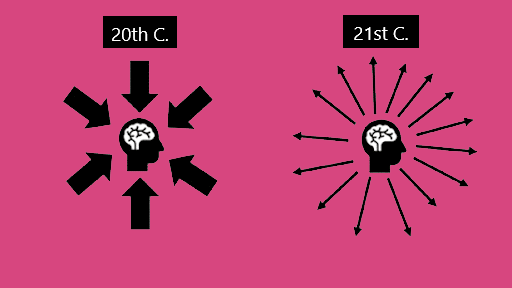
Credit: Marc Prensky
One sad result of our old frame is an “imagination crisis”—of our own making. I believe the only way our children will have a decent chance in the future is to get that imagination back. The New Journey to Empowerment is all about liberating and unleashing young people’s imagination and applying it to real-world accomplishment—with impact.
Reframing Needed
In order for us to liberate imagination, make the journey, and get to the end, it is necessary for people—both young and old—to see the world in new ways. I call these new ways “re-framings.” Re-framings are what this book is about.
These are the re-framings I will be talking about in the coming chapters:
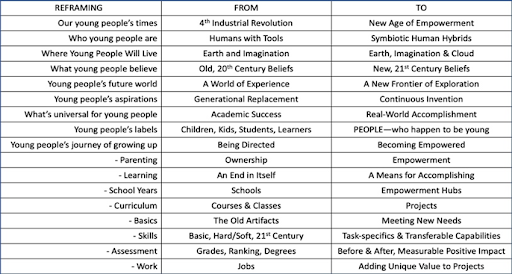
As we re-frame our young people’s world, we will be using a “map” to see where we are on the Journey to Empowerment:
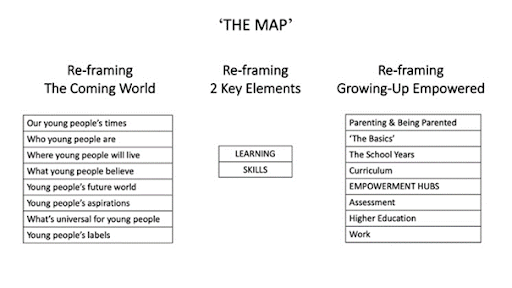
The Elements of Empowerment
But before we start on our journey of re-framing, I want to highlight four elements that I consider the basic needs for empowerment, so that you can keep them in mind as you read. They are:
- New, Empowering BELIEFS
- Real-World ACCOMPLISHMENT
- Technology & Team SYMBIOSIS
- Self-knowledge and applied UNIQUENESS
We will consider each of them—and its implications, as we move forward.
I want to also introduce, and highlight, two additional features. At the end of each chapter I offer “Harbingers” of the coming changes I describe. These are short vignettes of people I have met who are in advance of their time and have helped inspire my future thinking. Each chapter also concludes with a question or questions for you to reflect on.
Here are the first of these:
| Harbingers |
|
Two well-known participants on the journey that is coming are Elon Musk (from the old generation), and Greta Thunberg (from the new one). Musk is already in many ways what Greta will, I believe, become. Seen in terms of the four elements of empowerment above, Greta and Elon both have empowering beliefs—they know where they want the future to go. Both have accomplished much in order to get there. Both are unique. An important difference, though, is that Elon is already much more symbiotic with technology than is Greta. While Greta has big goals (mitigating climate change), she hasn’t yet figured out, as I write, how to use many of the resources now at her disposal to accomplish them. Elon not only has huge goals (mass electric cars, reusable rockets, going to Mars) but he is already employing every symbiotic technological extension he has to accomplish them. Greta and her generation will, I predict, soon figure out how to do this, and follow. |
| Reflection Questions |
| In what fundamental ways do you think the world of our children will be different from ours? Are adults’ fears of this coming world realistic, or are they unfounded or overblown? Most importantly, are our fear-induced behaviors stopping our young people from getting there faster? |
Read More: EMPOWERED!
- Chapter 1: Re-Framing Growing Up for a New Generation, Part 1
- Chapter 2: A New Generation Seeing Things in a New Way, Part 1 and Part 2
- Chapter 3: Re-Framing Our Young People's Times, Part 1 and Part 2
- Chapter 4: Re-Framing Who Young People Are, Part 1 and Part 2
- Chapter 5: Re-Framing Where Young People Will Live, Part 1 and Part 2
- Chapter 6: Re-Framing What Young People Believe, Part 1 and Part 2
The full book is available on Amazon.
Photo at top: DFID - UK Department for International Development, CC BY 2.0, via Wikimedia Commons.

